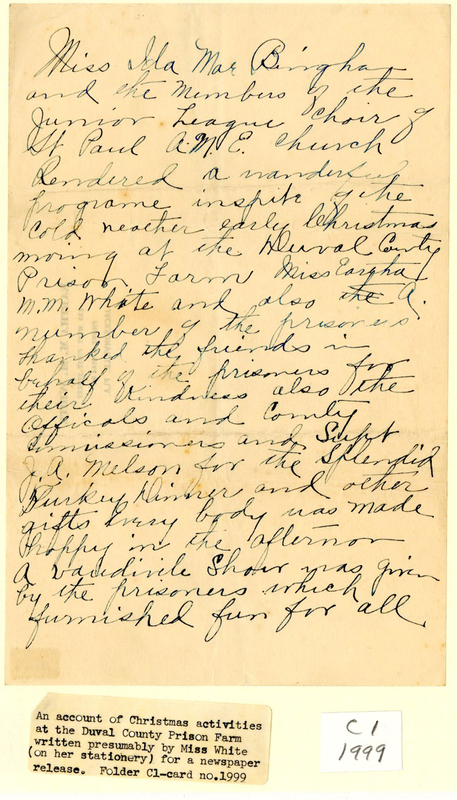Aiding and Advocating for the Marginalized: Social and Humanitarian Work in Jacksonville
Inside and outside of the church, black women worked to take care of their local communities through humanitarian work. The leaders of these endeavors were normally limited to elite or middle-class women who possessed free time and resources to spare. In Jacksonville and elsewhere, their work provided materially for the most vulnerable of an African American population that was already disadvantaged by segregation, depressed wages, precarious employment, and poor public services and infrastructure. Local black humanitarian efforts from churches, clubs, and other organizations were the only safety net those people had.
Eartha M. M. White and Prison Reform
The condition of segregated prisons and the treatment of black prisoners were of particular concern for Eartha M. M. White. In Jacksonville’s City Federation of Colored Women’s Clubs, Eartha M. M. White held the position of Head of the Prison and Slums department. She appealed to Florida Governor Park Trammel on behalf of female inmates. Her department also successfully convinced the Duval County commissioners that oversaw the county’s prisons to ensure the security of prisoners, to improve the sanitation of the facilities, and to build a chapel. They reported excitedly that by 1917, a year after they had spoked with the commissioners, they had obtained a bathing pool for the prisoners as well.
White also organized events for the prisoners which provided entertainment and good food. One Christmas, White organized a program for the prisoners with members of St. Paul A.M.E. Church. After a service, the prisoners received a turkey dinner and watched a vaudeville performance. White’s skills in communicating with a wide variety of people made the event possible. She recruited a choir from the local St. Paul A.M.E. Church while obtaining donations and concessions from local white county officials. With her advocacy, White defended Duval County’s incarcerated population, supporting especially the disproportional number of African American prisoners in places like the Duval County Prison Farm.

